

Inquiry-based learning. 1 Definition.
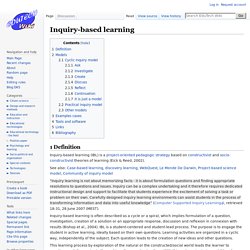
Learning Hasn’t Changed; social learning and facebook don't really add much. A few years ago I was asked for my annual prediction my e-learning magazine and I predicted the death of m-learning.
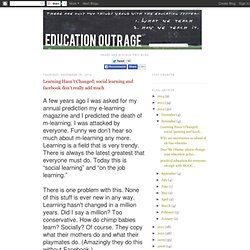
I was attacked by everyone. Funny we don’t hear so much about m-learning any more. Learning is a field that is very trendy. There is always the latest greatest that everyone must do. Project Based Learning. Self-Efficacy. This summary was written and compiled by Karin Kirk, SERC, and contains an overview of motivation research and pertinent references.
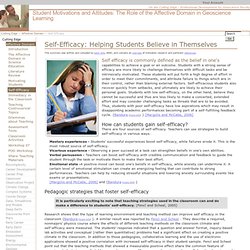
Self efficacy is commonly defined as the belief in one's capabilities to achieve a goal or an outcome. Students with a strong sense of efficacy are more likely to challenge themselves with difficult tasks and be intrinsically motivated. These students will put forth a high degree of effort in order to meet their commitments, and attribute failure to things which are in their control, rather than blaming external factors. Self-efficacious students also recover quickly from setbacks, and ultimately are likely to achieve their personal goals. Students with low self-efficacy, on the other hand, believe they cannot be successful and thus are less likely to make a concerted, extended effort and may consider challenging tasks as threats that are to be avoided.
Books, Online Articles, Audio, Bibliography. Bloom's Taxonomy of Learning Domains. Note: This site is moving to KnowledgeJump.com.
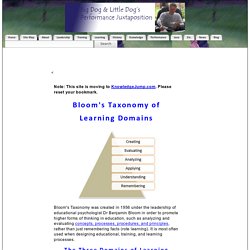
Please reset your bookmark. Bloom's Taxonomy was created in 1956 under the leadership of educational psychologist Dr Benjamin Bloom in order to promote higher forms of thinking in education, such as analyzing and evaluating concepts, processes, procedures, and principles, rather than just remembering facts (rote learning). It is most often used when designing educational, training, and learning processes. Paulo Freire and informal education. Contents: introduction · contribution · critique · further reading and references · links Paulo Freire (1921 – 1997), the Brazilian educationalist, has left a significant mark on thinking about progressive practice.
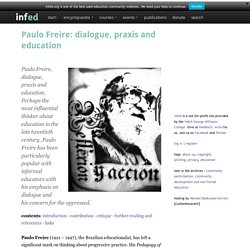
His Pedagogy of the Oppressed is currently one of the most quoted educational texts (especially in Latin America, Africa and Asia). Freire was able to draw upon, and weave together, a number of strands of thinking about educational practice and liberation. Sometimes some rather excessive claims are made for his work e.g. ‘the most significant educational thinker of the twentieth century’. Contribution. Constructivism (learning theory) Jean Piaget: founder of Constructivism In past centuries, constructivist ideas were not widely valued due to the perception that children's play was seen as aimless and of little importance.
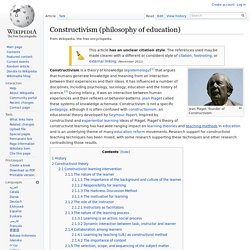
Jean Piaget did not agree with these traditional views, however. He saw play as an important and necessary part of the student's cognitive development and provided scientific evidence for his views. Today, constructivist theories are influential throughout much of the non-formal learning sector. One good example of constructivist learning in a non-formal setting is the Investigate Centre at The Natural History Museum, London.
For more detailed information on the philosophy of the construction of human knowledge, see constructivist epistemology. Formalization of the theory of constructivism is generally attributed to Jean Piaget, who articulated mechanisms by which knowledge is internalized by learners. Constructionism (learning theory) Seymour Papert Seymour Papert defined constructionism in a proposal to the National Science Foundation entitled Constructionism: A New Opportunity for Elementary Science Education as follows: "The word constructionism is a mnemonic for two aspects of the theory of science education underlying this project.
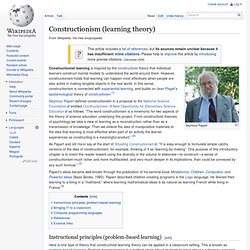
Connectivism. Connectivism is a hypothesis of learning which emphasizes the role of social and cultural context.
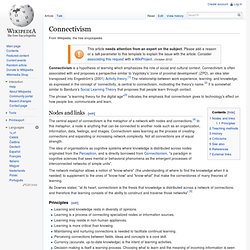
Connectivism is often associated with and proposes a perspective similar to Vygotsky's 'zone of proximal development' (ZPD), an idea later transposed into Engeström's (2001) Activity theory.[1] The relationship between work experience, learning, and knowledge, as expressed in the concept of ‘connectivity, is central to connectivism, motivating the theory's name.[2] It is somewhat similar to Bandura's Social Learning Theory that proposes that people learn through contact. The phrase "a learning theory for the digital age"[3] indicates the emphasis that connectivism gives to technology's effect on how people live, communicate and learn. Stereotype threat. Stereotype threat is the experience of anxiety in a situation in which a person has the potential to confirm a negative stereotype about his or her social group.[1] Since its introduction into the academic literature, stereotype threat has become one of the most widely studied topics in the field of social psychology.[2] Stereotype threat has been shown to reduce the performance of individuals who belong to negatively stereotyped groups.[3] If negative stereotypes are present regarding a specific group, group members are likely to become anxious about their performance, which may hinder their ability to perform at their maximum level.
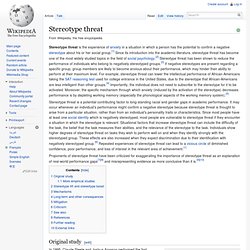
For example, stereotype threat can lower the intellectual performance of African-Americans taking the SAT reasoning test used for college entrance in the United States, due to the stereotype that African-Americans are less intelligent than other groups.[4] Importantly, the individual does not need to subscribe to the stereotype for it to be activated.